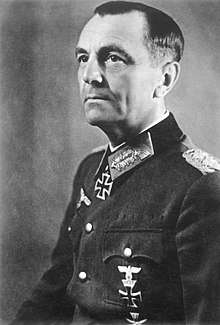
The Sixth Army, true to their oath and conscious of the lofty importance of their mission, have held their position to the last man and the last round for Führer and Fatherland unto the end.
Friedrich Wilhelm Ernst Paulus (23 September 1890 – 1 February 1957) was an officer in the German military from 1910 to 1943, attaining the rank of Generalfeldmarschall during World War II. He is most known for commanding the Sixth Army's assault on Stalingrad during Operation Blue in 1942. The battle ended in disaster for Nazi Germany when approximately 300,000 German soldiers were encircled and defeated in a massive Soviet counter attack in November 1942. Paulus surrendered to Soviet forces in Stalingrad on January 31, 1943, a day after he was promoted to the rank of Generalfeldmarschall by Adolf Hitler. Paulus served as an inspector of police after his release and died in Dresden, East Germany.
Sourced
- Troops without ammunition or food. Effective command no longer possible. 18,000 wounded without any supplies or dressings or drugs. Further defence senseless. Collapse inevitable. Army requests immediate permission to surrender in order to save lives of remaining troops.
- Radio message to Adolf Hitler, January 24, 1943. Quoted in "The World Changers" - Page 171 - by Bruce Bliven - 1965
- The Sixth Army, true to their oath and conscious of the lofty importance of their mission, have held their position to the last man and the last round for Führer and Fatherland unto the end.
- Radio message to Adolf Hitler, January 31, 1943. Quoted in "The Rise and Fall of the Third Reich: A History of Nazi Germany" - Page 931 - by William Lawrence Shirer - Germany - 1990
- You are talking to dead men here.
- To a Luftwaffe officer sent to Stalingrad. Quoted in "Voices From The Third Reich: An Oral History" - Page 152 - by Johannes Steinhoff, Peter Pechel, Helmut D. Schmidt, Dennis E. Showalter - History - 1994
- Everything you say, Reichenau, is totally unmilitaristic.
- To Walther von Reichenau. Quoted in "Hitler's Generals" - Page 210 - by Correlli Barnett - History - 2003
- Soldiers were and will remain soldiers. They fight, carrying out their duty, not thinking about the reasons, true to their military oath. And the beginning and the end of war is the business of politicians, to whom the situation at the front dictates these or other decisions.
- To A. Schmidt and others - February 4th, 1943. Quoted in "Report of the Special Section of the Don Front NKVD to Special Sections Department of NKVD USSR"
About Paulus
- What hurts me the most, personally, is that I still promoted him to field marshal. I wanted to give him this final satisfaction... a man like that besmirches the heroism of so many others at the last moment. He could have freed himself from all sorrow and ascended into eternity and national immortality, but he prefers to go to Moscow.
- Adolf Hitler, about Paulus surrendering instead of committing suicide.
- A very clever man though perhaps not a very strong character.
- Erich von Manstein to Leon Goldensohn, June 14, 1946.
- He is at pains to avoid making enemies. He is slow, but very methodical. He displays marked tactical ability, though he is inclined to spend overmuch time on his appreciation.
- Report about Friedrich Paulus by German Army soldier in 1927
- Surrender is forbidden. Sixth Army will hold their positions to the last man and the last round and by their heroic endurance will make an unforgettable contribution toward the establishment of a defensive front and the salvation of the Western world.
- Adolf Hitler, radio response to Paulus, January 24, 1943
External links
This article is issued from
Wikiquote.
The text is licensed under Creative
Commons - Attribution - Sharealike.
Additional terms may apply for the media files.